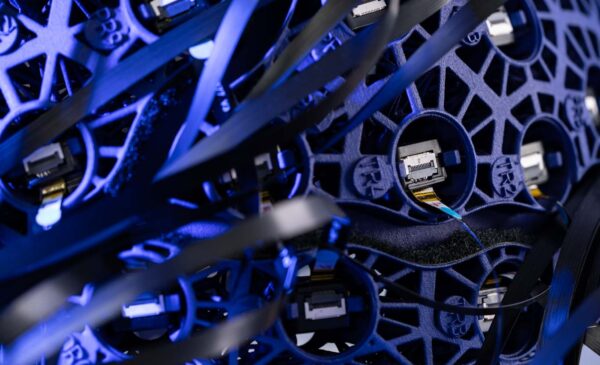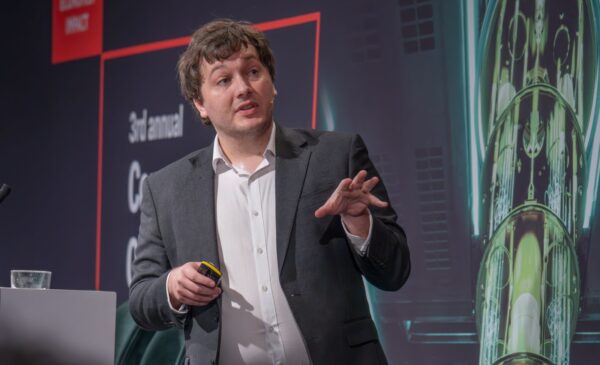UK Quantum Technology Hub Sensors and Timing researchers at the Universities of Birmingham, Glasgow, Nottingham, National Physical Laboratory and Imperial College London have been awarded over £4 million in UKRI funding as part of a £45 million investment to development quantum technologies, announced by the Science Minister, George Freeman MP, during London Tech week.
UK Quantum Technology Hub Sensors and Timing projects which have received funding awards are:
- Quantum Sensing on the London Underground, led by Dr Joseph Cotter (Imperial College London) alongside Professor William Pike (Imperial College London) and partnered with BAE Systems:
This project will help to explore how quantum sensors can complement the use of the global navigation satellite systems (GNSS) that much our systems are reliant upon. GNSS enables real-time access to the location of items for delivery and supports the transportation of goods and services including maritime and road transit. However, GNSS can be vulnerable to adverse weather conditions, jamming and has limited capability underwater and underground. Partnering with Transport for London (TfL), the team will test the new technology on trains.
- Portable strontium lattice clock for ultra-stability and long holdover (POSSIBLE), led by Professor Yeshpal Singh, University of Birmingham; Professor Patrick Gill, NPL, and partnered with BAE Systems:
This project aims to build the world’s most advanced and user-friendly field deployable quantum clock, with an accuracy that approaches the best international laboratory clocks. Amazingly, optical clocks remain accurate to within a second over the age of the universe, and bringing these clocks from the labs to real-world applications offers huge potential across sectors such as telecommunications, navigation, sensing and fundamental science. This project aims to deliver a 20x more accurate clock in a 3x smaller volume than current transportable systems. The clock will prove valuable to many academic and industry communities across medical physics, as the higher resolution provided by the clocks will improve precision spectroscopy, opening the potential for new discoveries. Radar and communication engineers will benefit from ultra-stable clocks to help realise networked radar systems, wider telecommunication schemes and advanced quantum communication.
- A Chip-Scale 2-Photon Rubidium Atomic Clock, led by Prof Douglas Paul (Glasgow) partnered with Dr Kevin Gallacher (Glasgow) and Professor Marc Sorel (Glasgow), partnered with Kelvin Nanotechnology:
The Chip-Scale 2-Photon Rubidium Clock project aims to integrate all the lasers, Rb MEMs cells, micro-resonator frequency combs and photonic integrated circuit components all into a single heterogeneously integrated chip as required for a thermal rubidium 2-photon optical atomic clock.
- Hybrid atomic gyroscope, led by Dr Thomas Fernholz (Nottingham) alongside Dr Kasper Jensen (Nottingham), Professor Jason Ralph (Liverpool) and Dr Adil Meraki (Nottingham), partnered with Civitanavi Systems:
This project aims to develop gyroscopes which can be used for inertial navigation. Inertial measurement units are instruments that sense acceleration and rotation rates of a vehicle with high accuracy and precision. By monitoring these quantities in all three spatial dimensions and tracking their temporal behaviour, the current location in reference to a known starting point can be determined even when access to any other external references is unavailable, e.g., satellite based-navigation. However, errors or uncertainties in the measured rates will accumulate and make inferred positions unreliable over longer periods of time. To improve the performance of such devices, researchers will investigate the combination of two types of quantum gyroscopes. One type continuously observes the pointing axis of spinning atomic nuclei as an orientational reference to obtain a fast and high-dynamic range signal. The other type will use low-rate measurements of quantum mechanically interfering matterwaves to improve the accuracy of rotation rate measurements.
- TOPological optimisation of technologies for high-bandwidth atomic Gravimetry Used in Navigation Systems, led by Dr Yu-Hung Lien (Birmingham) alongside Professor Mark Fromhold (Nottingham), Professor Michael Holynski (Birmingham), Dr Lucia Hackermueller (Nottingham), Dr Peter Hobson (Nottingham), partnered with Metamorphic Additive Manufacturing Ltd and Toyota:
This project aims to tackle several obstacles for cold-atom quantum gravity sensors in navigation applications. While operating in dynamic environments, the performance of cold-atom quantum gravity sensors is severely affected by carrier motion through signal degradation and crosstalk between different kinds of motions. The magnetic field requirements of the sensors, especially under a high bandwidth operation, also pose a significant challenge to the metallic construction of the sensors for robustness. A research team led by Dr Yu-Hung will collaborate with Professor Mark Fromhold’s team at the University of Nottingham to tackle the abovementioned issues by the approach of topological optimisation. The Birmingham team will develop a novel scheme to suppress the signal degradation and the crosstalk whilst the Nottingham team will design an innovative integrated sensor head to manage the transient magnetic behaviour and weight with the aid of 3D printing.
“It is fantastic that an exciting range of projects from Hub researchers and beyond have received funding in this call. Quantum sensing and timing have the potential to transform Positioning, Navigation and Timing, and this funding from EPSRC, as part of the National Quantum Technologies Programme, will help that come to fruition.”Professor Michael Holynski, Principal Investigator, UK Quantum Technology Hub Sensors and Timing




